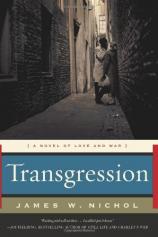Reading Group Guide
Discussion Questions
Transgression

1. Adele Georges' father seems to loom large in her interior life. What effect does his admirable example and his admonition to her when she was young to "try your best to be of service to your fellow man. That's the most important thing in life. Isn't it?" have on Adele's subsequent behaviour? Or does it have any effect at all?
2. We are introduced to two very different societies, France while occupied by the German army, and post-war North America. Viewed from Adele's difficult situation, what are the similarities?
3. The Canadian local chief of police, Jack Cullen seems to be slowly descending into a delusional state as he pursues the mystery behind the detached finger. Adele, particularly in her two year pursuit of the missing and quite likely dead Manfred Halder, also seems to be losing her hold on reality. How much of their individual dislocation could be attributed to the war? How much to more deep-seated issues in their personalities and lives?
4. When Adele visits Manfred on leave in La Bouille, she tells him that they are the beginning of a New European Order…not the kind Adolf Hitler had in mind…but a world in which love and a shared humanity trumps national conflicts...where war could no longer happen. Manfred says that this would be his dream, too. Does the rest of the novel suggest that this dream is at all attainable or does it remain only an expression of their youthful naivete?
5. The search for family is a constant theme in the book. Adele tries to reconstruct her own family on several occasions. With whom, and why is the idea of family so important to her? What is she trying to find?
6. Alex is attracted to Adele from the first moment she asks him about Dresden in the beer garden in Weimar. What does he sense about her that is so instantly compelling to him?
7. How important are female relationships to Adele, compared to the central role males play in her life? And whether for good or for bad, how do they affect her choices?
8. Adele has gone to Alex's doctor without his knowledge to get him some pills to help quieten his nerves and lessen the flashbacks from the war. He's angry with her and refuses to take them. She insists that he take them and take them regularly. It's a momentary stalemate as they stand facing each other in their bedroom. Adele thinks to herself that this is the moment of all moments, that this is her life. Why is this moment so important to her?
9. After Johnny Watson is shot, Adele is forced to ask herself who she really is. She has no idea because she has to admit that for the briefest of moments this horrific act of retaliation had given her pleasure. It's as if, for that one moment, she had become someone else. Was she justified in doing what she did? Could she have done something else? And does what she did and felt have anything more deeply to say about the other acts of violence, both on a large scale and personal, in the rest of the book?
10. Is it possible that Johnny Watson, during his stay in France, did somehow hear about Adele and what she had done? If not, why is he so cruel to her?
11. As Adele lies in her house by the sea and feels the first pains of child birth, she hears the surf rolling up on the beach and she has a vision of Etienne, the lost boy from Buchenwald walking out of the water toward her. What do you think this final vision means?
Transgression
- Publication Date: September 22, 2009
- Paperback: 352 pages
- Publisher: Harper Paperbacks
- ISBN-10: 0061782319
- ISBN-13: 9780061782312







